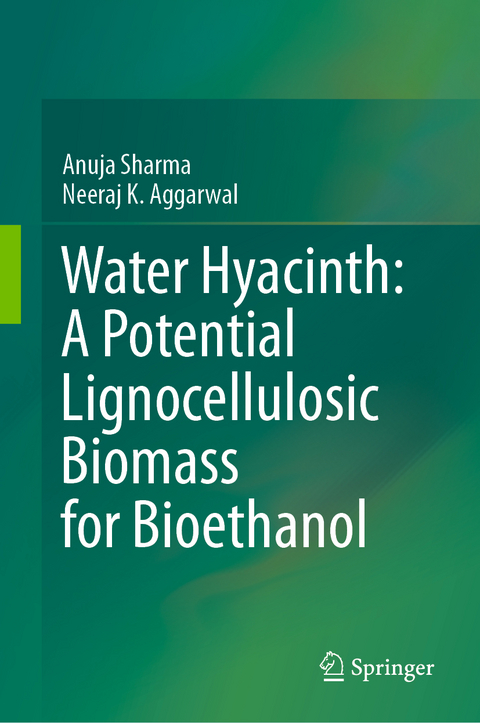
Water Hyacinth: A Potential Lignocellulosic Biomass for Bioethanol
Springer International Publishing (Verlag)
978-3-030-35631-6 (ISBN)
This book discusses the production of bioethanol from water hyacinth, a potential source of lignocellulosic biomass. Biofuels, as an alternative to fossil fuels, not only ensure energy security but also mitigate air pollution and reduce greenhouse emissions. Biofuels can be produced from sugar- and starch-rich food crops (first-generation biofuel) or lignocellulosic biomass (second-generation biofuel). However, the overexploitation of conventional lignocellulosic sources such as agro-industrial residues, dedicated herbaceous, hardwoods and softwoods and forest residues may lead to problems in terms of land management and biodiversity conservation. Non-conventional sources include industrial cellulosic waste, municipal solid waste and weeds. Of these, weeds are an attractive lignocellulosic source due to their prevalence and easy availability. Eichhornia crassipes, commonly known as water hyacinth, is one of the world's most invasive weeds due to its rapidproliferation rate, efficient survival strategies in extreme conditions, and it has a significant impact on the environment, ecological communities, human health and socioeconomic development. Strategies including physical removal, chemical methods and biological control agents have proven inefficient in completely eradicating Eichhornia crassipes. On the other hand, water hyacinth has a low lignin and high holocellulose content and is a rich source of lignocellulosic biomass, and has therefore been exploited as a raw material for the production of biofuel, biogas, animal and fish feed, compost and other valuable products. Further, being an aquatic plant, it does not compete with food crops for land resources. The bioethanol-generating capacity of water hyacinth is comparable to that of agricultural waste, making it a potential raw material for biofuel production.
Dr. Anuja Sharma is Ph.D. in Microbiology from the Department of Microbiology, Kurukshetra University, Kurukshetra, India. Her Ph.D. thesis title is "Biological Pretreatment of Water hyacinth (Eichhornia crassipes) for Delignification." She has more than 6 years of research experience. She has received various proficiency awards for her academic achievements. She is a gold medalist in Microbiology and has been awarded First Rank Certificate and gold medal for MSc. Microbiology. She has published 5 research papers, 4 review articles in journals of national and international repute. Dr. Neeraj Kumar is presently working as a Senior Assistant Professor and Chairman in the Department of Microbiology, Kurukshetra University, Kurukshetra, India. He has more than 11 years of research and teaching experience. He has guided 15 Ph.D. students and presently 6 students are working under his guidance. He is gold medalist and has been awarded prestigious SR Vyas gold medal for being best microbiological research worker. He has published more than 120 research papers, reviews and book chapters in various journals of national and international repute. He also authored a popular text book "Introduction to Biotechnology" and edited a book "Microbiology and Biotechnology for sustainable Environment". He is a member of various academic and professional bodies. He has been awarded Summer Research Fellowship by NASI, India. His research areas include bioethanol production from agricultural residues and weeds, use of different industrial effluents for the production of important metabolites, molecular genetics etc.
1. Introduction.- 2. Water hyacinth: An Environmental Concern or A sustainable lignocellulosic substrate.- 3. Lignocellulolytic Enzymology.- 4. Pretreatment strategies: Unlocking of lignocellulosic substrate.- 5. Biological pretreatment: Need of the Future.- 6. Strategies for Saccharification of Lignocellulosic substrate.- Bioethanol production from Water hyacinth.
| Erscheinungsdatum | 24.01.2020 |
|---|---|
| Zusatzinfo | X, 106 p. 4 illus., 2 illus. in color. |
| Verlagsort | Cham |
| Sprache | englisch |
| Maße | 155 x 235 mm |
| Gewicht | 371 g |
| Themenwelt | Naturwissenschaften ► Biologie ► Mikrobiologie / Immunologie |
| Naturwissenschaften ► Biologie ► Ökologie / Naturschutz | |
| Technik ► Elektrotechnik / Energietechnik | |
| Schlagworte | Aquatic weed • Bioethanol • Bioethanol Production • Biological Pretreatment • ligninolytic enzymes • Lignocelluloses • Sustainabl lignocellulosic substrate • Water hyacinth |
| ISBN-10 | 3-030-35631-0 / 3030356310 |
| ISBN-13 | 978-3-030-35631-6 / 9783030356316 |
| Zustand | Neuware |
| Haben Sie eine Frage zum Produkt? |
aus dem Bereich


